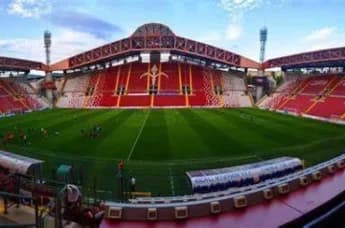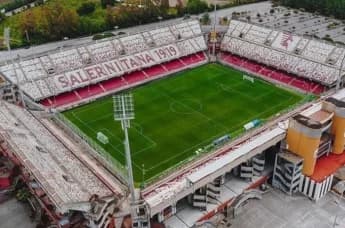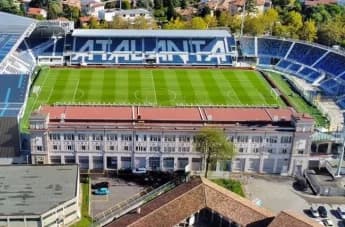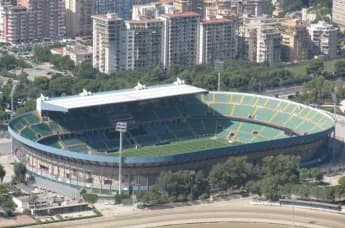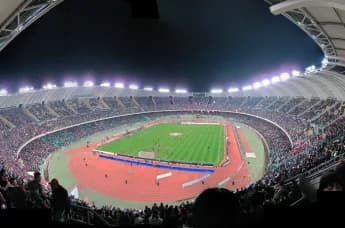Estadio Azteca stands not only as Mexico's largest football venue but also as a global symbol of sports culture, having hosted two FIFA World Cup finals and unforgettable matches.
Nestled in the lively city of Mexico City, Estadio Azteca is not only the largest football stadium in Latin America but also one of the most renowned in the world. With a seating capacity of 87,523, it serves as a symbol of football culture, hosting the prominent local team, Club América, as well as the Mexico national team. Positioned at an elevation of 2,200 meters (7,200 feet) above sea level, the stadium provides fans with a distinctive atmosphere that enhances the thrill of every match.
The stadium, crafted by the distinguished architects Pedro Ramírez Vázquez and Rafael Mijares Alcérreca, commenced construction in 1961 and officially opened in 1966. It swiftly emerged as a representation of Mexico's dedication to sporting excellence, harmonizing contemporary architecture with the vibrant spirit of the Mexican populace.
As one of the largest and most esteemed football stadiums in the world, Estadio Azteca remains a vital participant in significant football events, surpassing its function as merely a sports venue. It is an iconic location that embodies the essence of international football and the broader sports culture.
Memorable Matches
The rich history of Estadio Azteca is marked by the many iconic matches that have taken place within its confines, solidifying its reputation as a legendary football venue. The stadium is famous for hosting two FIFA World Cup finals: the first in 1970, where Brazil emerged victorious against Italy with a score of 4–1, and the second in 1986, when Argentina triumphed over West Germany 3–2. These finals are immortalized in football history, with the stadium providing the backdrop for some of the most memorable moments in the sport.
One of the most memorable matches held at the stadium took place during the quarterfinals of the 1986 World Cup, featuring Argentina against England. This match is renowned for Diego Maradona's remarkable 'Hand of God' goal and the legendary 'Goal of the Century,' both of which are celebrated highlights in football history. Estadio Azteca served as the backdrop for these iconic moments, further solidifying its status as a place where historic events unfold.
In addition to hosting World Cup finals, the stadium has been the site of many memorable matches, including the 1970 semifinal between Italy and West Germany, famously referred to as the 'Game of the Century.' This electrifying match ended in a 4–3 victory for Italy, thrilling the crowd and further cementing the stadium’s reputation as a place for extraordinary football experiences.
Amenities & Services
The unique design and amenities of Estadio Azteca distinguish it from other football stadiums worldwide. Over the years, the venue has seen multiple renovations to ensure it remains at the forefront of modern sports facilities while preserving its historical appeal. A significant aspect of this modernization was the installation of contemporary Panasonic LED panels at both the north and south ends of the stadium in 2015, which was part of a comprehensive renovation initiative.
The stadium features an extensive seating layout that guarantees every supporter a fantastic view of the field. With a capacity exceeding 87,000, the immense scale of the venue creates an exhilarating experience, allowing fans to immerse themselves in the electric atmosphere, whether they are close to the action or seated higher up in the stands.
Besides the seating arrangements, Estadio Azteca boasts cutting-edge facilities, which include VIP boxes, deluxe suites, and contemporary media areas, all crafted to elevate the fan experience. These amenities provide fans with an extraordinary view of the action while ensuring they enjoy premium services.
Significance in History
Since its inauguration, Estadio Azteca has played a pivotal role in the saga of international football. Its distinction as the first stadium to host two FIFA World Cup finals has cemented its reputation within the global football community. The finals of 1970 and 1986 are not merely significant events in the tournament's history; they are also landmark moments in the overall narrative of the sport, showcasing some of the most iconic football players ever.
The stadium also played a significant role during the 1968 Summer Olympics by hosting the football final, further solidifying its reputation as a premier sports venue. In addition to its football legacy, Estadio Azteca emerged as a cultural icon, hosting major events including concerts by artists such as Michael Jackson, U2, and Paul McCartney, among others, demonstrating that the stadium goes beyond its sports origins.
For the Mexico national team, Estadio Azteca has acted as a stronghold and a symbol of pride, marking the site of many historic victories. It continues to be the preferred venue for the national team's most crucial matches, highlighting its significance in the cultural and historical context of sports in Mexico and beyond.
Future Events
As we look to the future, Estadio Azteca is poised to uphold its legacy of hosting international football events, with the 2026 FIFA World Cup approaching. The stadium has been chosen to hold the opening match of the tournament, signifying an extraordinary third occasion that it will contribute to the World Cup’s history.
Besides the World Cup, the stadium is scheduled to host a variety of matches, including games from the group stage and knockout rounds, as the tournament progresses throughout the United States, Canada, and Mexico. This represents a noteworthy chapter in the stadium’s legacy, reinforcing its status as one of the leading football venues in the world.
Preparations for these events will include renovations aimed at enhancing the stadium's infrastructure. This will involve improvements such as upgraded seating and a refreshed façade. These enhancements are designed to ensure that Estadio Azteca continues to be a leading venue in the global football scene, poised to welcome fans for a new era of unforgettable matches.
Experience for Fans
Attending an event at Estadio Azteca is an exhilarating experience. This grand stadium, steeped in history and offering breathtaking views, creates a distinctive atmosphere that melds excitement, tradition, and cultural pride. Whether spectators are cheering for Club América against their rivals or supporting the national team on an international stage, they are immersed in a vibrant environment that few other venues can replicate.
The venue prioritizes the fan experience, featuring a variety of amenities that enhance every matchday. Within the stadium, there are multiple dining options, merchandise stalls, and fan engagement areas where supporters can connect with the team's history before the game starts.
For attendees of international events, the atmosphere is heightened, as fans from across the globe unite to witness history unfold. Estadio Azteca's capacity to host both sports and cultural happenings makes it an exceptionally distinctive venue, where the experience transcends the game itself.



